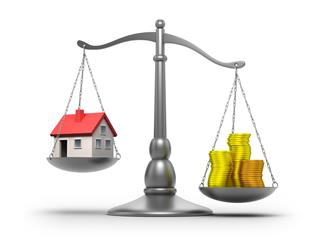
A HUD home is one that was bought with an FHA loan, and is now foreclosed. This WealthHow article will enumerate the pros and cons of buying HUD homes.
HUD stands for Department of Housing and Urban Development. It is a federal agency that is responsible for providing affordable housing and creating strong communities. A HUD home is a foreclosed property. The procedure of selling it, however, is not like regular real estate dealings. The property is auctioned and sold. You need to carry out extensive research before thinking of purchasing the house. The paragraphs below enlist the advantages and disadvantages of buying HUD homes.
- As mentioned above, a HUD home resale is not a regular procedure.
- The HUD takes a home under its wing if the loan on that home had been approved by the FHA (Federal Housing Administration) and has now been foreclosed.
- The HUD uses asset management companies to sell these properties.
- When the home is out in the market, the buyer has to engage an HUD-registered real estate agent and find out everything about the property.
- A property inspection must be conducted, and if you are satisfied, you can send a sealed bid during the offer period.
- You will be informed if your bid is accepted. If it is, you will be given some settlement time, between which you have to buy the house and close the deal.
- If you purchase a HUD home, you may be eligible to qualify for FHA-financing.
- The FHA has many schemes, and if you qualify for any of them, you will be provided with some capital to pay for your house.
- If your home needs repairs, you can check if you qualify for the FHA Rehabilitation Loan, which helps provide money for repairing and fixing your home.
- You need to check the eligibility criteria before deciding all this; after you qualify for the same, you can complete the required documentation and go ahead.
- Buying HUD homes for teachers may be simpler, since the HUD offers some discount for teachers, EMTs, and legal officers.
- In many cases, the HUD may pay up to 3% of the closing costs; however, this may be provided only in case of low-income buyers.
- Depending on the situation, the HUD may pay escrow fees as well.
- There are plenty of properties available in the market; the buyer therefore, has a lot of choice when he has to purchase a HUD home.
- If the buyer does some basic research and finds that he does not like a certain home, he always has other options.
- Many of the available properties may have been left in a very good condition as well.
- Owner occupant buyers have an advantage over investors while buying HUD homes.
- They are given the first priority while buying the homes; this is because HUD requires the buyer to stay in the house for at least 12 months.
- Investors, on the other hand, buy a HUD home solely for an investment purpose; moreover, they cannot bid until the home has been listed for 30 days.
- Thus, owner occupants have an advantage to buy the property sooner.
- HUD foreclosures, as mentioned above, are now available in many areas.
- Some of these areas may be the ones you like, and getting your home there will be a dream come true.
- A HUD home is always sold at a rate lesser than the market rate; you will thus, find a good house for a reasonable rate in the area of your choice.
- This is one of the primary problems with buying HUD homes.
- The property had been owned by someone, which means that there could be minor/several damaged interiors.
- There could be a leak in the roof, cracks in the wall, problems with the wiring, etc.
- Even if you may be able to buy the house, you may find it expensive to maintain.
- This pointer encompasses the one mentioned above as well.
- The home is sold to you ‘as is’, i.e., there is a possibility that the house is not in a very good condition.
- You may have problems with the utilities, and many other construction-related problems as well.
- Generally, the HUD will not help you in matters regarding finance.
- Though the FHA offers financing initiatives, you have to qualify for the same.
- You will not even be offered any capital for repairing the house; buying the property is completely at your risk, the HUD will not claim responsibility for any repair.
- This means that if you unfortunately happen to buy the house without inspection and find out that you have to spend a lot on repairing, it will be a complete waste.
- After your bid gets accepted, you are given a settlement time.
- If you have your finances in order, it would be better to buy the home soon, because if any problem occurs during the waiting period (wall mold, heater problems, etc.), you may not be able to back out.
- If you back out of the deal anyway, you will lose the offer money.
- Worse still, if you have paid up an initial equity, you will lose that money too, or else you have to stay in the house and spend money for renovating it.
- You must now be wondering if buying HUD homes is a good idea.
- This decision is heavily dependent on the situation.
- You will find many real estate dealers and other investors who claim that it is indeed advantageous to buy the property.
- All the same, there have been instances where people have had to put up with faulty wiring, leaking, and other issues, which they had been unaware of, during inspection.
- HUD however, is known to introduce newer initiatives with regards to accommodation, and that is an advantage too.
- To summarize, however, it would be better to make the decision based on the circumstances.
- You can know more about some other pointers before deciding to purchase a HUD home.
The pros and cons listed above may work differently for different people. A particular pointer can be an advantage and a disadvantage at the same time. It is up to the buyer to analyze the circumstances, evaluate the positives and negatives, and make an informed choice.

